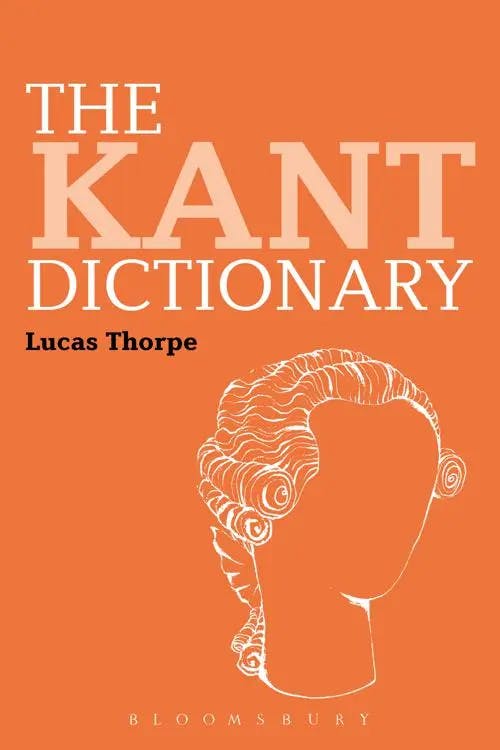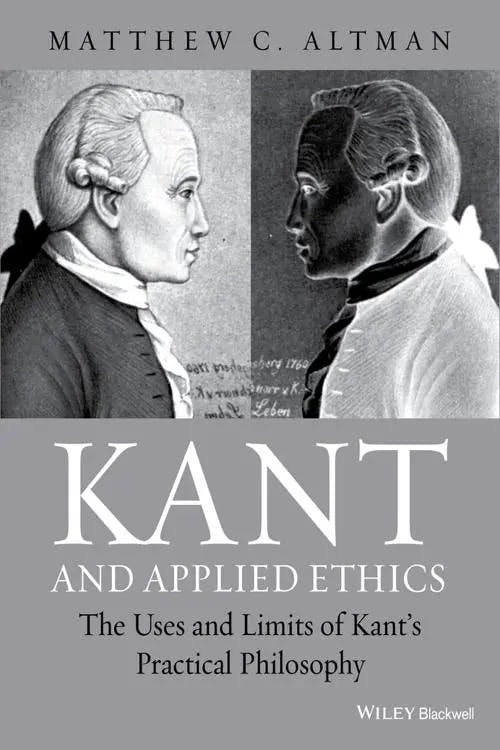What is Kantian Ethics?
MA, Philosophy (University of Cambridge)
Date Published: 06.03.2023,
Last Updated: 24.01.2024
Share this article
Summarising Kantian Ethics
Kantian ethics is an ethical theory developed by German philosopher Immanuel Kant, who was a key Enlightenment thinker. In essence, Kant formed the ethical theory that an action’s moral worth is determined entirely by the motivation behind it. It has proven to be of lasting importance, with many contemporary philosophers, such as Christine Korsgaard, following and developing the Kantian school of moral thought.
Kantian ethics is outlined in a number of Kant’s works - but the most influential of these works is Groundwork on the Metaphysics of Morals. In Groundwork, Kant aims to establish the underpinnings of morality, to establish the indisputable existence of a universal moral code, and to explain the contents of this moral code. In particular, one of Kant’s key missions in Groundwork is to establish that moral principles can be determined a priori, from reason alone:
All moral concepts have their seat and origin completely a priori in reason, and indeed in the commonest human reason. (Kant in Gregor and Timmermann, 2012)
Mary Gregor, Jens Timmermann
All moral concepts have their seat and origin completely a priori in reason, and indeed in the commonest human reason. (Kant in Gregor and Timmermann, 2012)
In The Groundwork, the most famous principles of Kantian Ethics are also outlined. These are:
- Good Will
- Duty
- The Categorical Imperative
In this study guide, we will examine how Kant’s ethical theory qualifies as a deontological ethical theory. We’ll then analyse the role of motivation and duty in Kant’s ethics, and the importance of the categorical imperative, which helps us to discover the content of our duties. Finally, we will consider some key critiques of Kantian ethics.
Deontology: The Idea of Duty-Driven Ethics
Kantian ethics is typically understood as falling under the category of deontological ethics, because it is rule based. A central tenet of the theory is that the morally right action is determined by its conformity with duty, rather than whether it produces ‘good’ consequences.
There are a set of laws which determine our duty, and an action’s moral worth is determined by whether or not we are acting out of duty.
This is as opposed to teleological theories, such as utilitarianism, which propose that an action is right or wrong depending on its consequences, rather than adherence to any kind of rules or sense of duty. Teleological theories define morally right actions in terms of an idealised goal - specifically a notion of ‘the good’ (good consequences, or good action).
But for Kant, the consequences of an action are morally irrelevant: it is only an agent’s motivation which can determine whether or not an action is morally right.
Good Will & Kantian Ethics
To understand Kant’s understanding of duty, it’s important to also comprehend his notion of ‘Good Will’.
In Groundwork, Kant writes,
It is impossible to think of anything at all in the world, or indeed even beyond it, that could be taken to be good without limitation, except a good will.
For Kant, when somebody has a good will, then whatever action they take will consequently be the morally correct course of action. But what is a good will?
Paul Guyer's book Kant explains that,
Such a will manifests itself only in doing one’s duty for its own sake … and since doing duty for its own sake deprives the will of any object of desire as a reason for action, nothing is left as a possible principle of morality “but the conformity of actions as such with universal law. (2014)
Paul Guyer
Such a will manifests itself only in doing one’s duty for its own sake … and since doing duty for its own sake deprives the will of any object of desire as a reason for action, nothing is left as a possible principle of morality “but the conformity of actions as such with universal law. (2014)
So, good will is demonstrated when a person is motivated by their duty. Acting out of duty means that the recognition and adherence to moral principles is sufficient motivation, rather than any inclinations or desires underpinning the motivation.
Kant’s famous illustration in Groundwork is of a merchant who always ensures that they do not shortchange their customers. They do so because they know that if they regularly give out the wrong change, it would be bad for business. They are motivated by their desire to stay in business; it just so happens that their action also conforms with a moral duty - but as the motivation is something other than a sense of duty, their action has no moral worth.
Conversely, a merchant who always gives the correct change, and does so purely because he recognises that he has a duty to do so, is demonstrating a good will. His actions therefore have moral worth.
Imperatives & Maxims
Having established that duty is the only source of moral motivation - and that a will motivated by duty is a ‘good will’, Kant outlines the content of his ethical theory.
We have to be motivated by duty to do the right thing - but what, then, are our duties? Their content is determined by what Kant takes to be the principle which underlies morality - the categorical imperative,
Act only according to that maxim whereby you can, at the same time, will that it should become a universal law. (Kant in Gregor and Timmermann, 2012)
This first formulation of the categorical imperative is usually known as the ‘Formula of Universal Law’. To understand its meaning, it’s important to understand what Kant means by both ‘maxim’ and ‘imperative’.
A maxim is a kind of principle. In the context Kant is using the term, it refers to a principle which underpins action. For instance, “I will never lie” is a maxim, as it’s a principle which provides a guide for future actions.
An imperative is a command, or order. When an imperative is hypothetical, whether or not it should be obeyed can be contingent on a number of factors. For instance, take the imperative: ‘You should study’. This is an imperative, but it is conditional - because whether or not it’s true that you should study depends on whether or not you wish to pass, whether you value education, etc.
By contrast, a categorical imperative is unconditional. It’s a command that we should always follow.
But how does this relate to the content of Kant’s moral theory? How does it help us to determine our duties? The Universal Law formulation states that when we act, our actions must follow from maxims which are ‘universalizable’. It helps us to determine our duties, as it dictates the content that our maxims should have.
Kant's Four Types of Duty
Kant held that there are four types of duty - perfect duties towards ourselves and others, and imperfect duties toward ourselves and others. In Groundwork, Kant writes that Perfect duties ‘[allow] of no exception to the advantage of inclination’ - so these are duties which must always be followed. Kant does not explicitly state this in Groundwork but the implication is that imperfect duties do occasionally allow for exceptions, and they do not have to be followed in every case.
The universal law formulation helps us to see whether an action is a perfect or imperfect duty. When deciding which course of action to take, you should imagine that the maxim which guides your action is a universal law, which governs all rational agents. All such agents must act as you do. When attempting to universalise a maxim, and finding that it is inconceivable that it could be a universal law, the result is a perfect duty.
Kant’s provides two examples of perfect duties in Groundwork: False promises & suicide. We detail each of these in turn below.
1.) False promises: We have a perfect duty to others not to make false promises. Kant gives the example of somebody acting under the following maxim:
When I believe myself to be in need of money I shall borrow money, and promise to repay it, even though I know that it will never happen. (Kant in Gregor and Timmermann, 2012)
This maxim cannot be universalised without a ‘contradiction in conception’. This is because if everybody were to adhere to this maxim, the institution of promising simply would not exist, as it relies on the presupposition that people at least sometimes keep their promises. Thus it is an inconceivable world - as it references promising, yet promising cannot exist in this world,
About this book
It could never hold as a universal law of nature and harmonize with itself, but must necessarily contradict itself. For the universality of a law that everyone, once he believes himself to be in need, could promise whatever he fancies with the intention not to keep it, would make the promise and the end one may pursue with it itself impossible, as no one would believe he was being promised anything, but would laugh about any such utterance, as a vain pretense. (Kant in Gregor and Timmermann, 2012)
Format PDF
Year 2012
2.) Suicide: Kant’s second example of duty is the perfect duty to ourselves to refrain from suicide. Kant describes an individual who is unhappy and wants to end their life. He states in Groundwork that the maxim that they would be acting under would be: “from self-love I make it my principle to shorten my life if, when protracted any longer, it threatens more ill than it promises agreeableness.”
But this maxim, says Kant, cannot become a universal law of nature as it results in a contradiction in conception - as self-love by its nature impels improvement of life. If its aim was self-destruction, it would be contradictory. (A note that this is a slightly tricky and dated example, as the contradiction here hinges on the assumption that suicidality is always driven by self-love - which arguably is often not the case.)
We also have imperfect duties. Imperfect duties involve a contradiction in willing when attempting to universalise a maxim which opposes them.
Again, Kant provides two examples:
3.) Cultivation of Talent: Kant uses the example of the duty to cultivate our talents as an example of an imperfect duty to ourselves. In his illustration, a person doesn’t feel particularly inclined to develop their natural abilities and talents, as they’d prefer to amuse themselves in other ways, and feel comfortable as they are. This individual finds that it’s conceivable that a maxim of neglecting natural talents could be a universal law of nature, but that they can’t rationally will that it becomes a natural law. A rational being would always will that their capacities are developed, as they can serve them and help them in attaining their ends.
However, as an imperfect duty, the agent is not morally obligated to always develop their talents at all times.
4.) Helping others: Kant provides the example of the duty to help others as an example of an imperfect duty to others. Again, it’s conceivable for there to be a universal law that we never help others. Nothing about this state of affairs is contradictory. But we cannot rationally will that it holds as a law. As rational beings, we have ends - and sometimes, in order to acquire these ends, we need assistance. So we cannot rationally will to potentially obstruct the attaining our ends by willing that nobody ever helps anybody.
The Categorical Imperative: Humanity as an end in itself
As the Groundwork develops, Kant outlines several additional formulations of the categorical imperative.
The second formulation of Kant’s categorical imperative is "The Formula of Humanity":
“So act that you use humanity, in your own person as well as in the person of any other, always at the same time as an end, never merely as a means.” (Kant in Gregor and Timmermann, 2012, p. 87)
This formulation tells us that when we act, we must ensure that we are never solely using others as a means to our own end.
Kant means something quite specific by humanity here. As Christine Korsgaard explains in Creating the Kingdom of Ethics:
Kant interchanges the terms "humanity" and "rational nature". ... Kant takes the characteristic feature of humanity, our rational nature, to be the capacity for setting an end. Ends are "set" by practical reason; human beings are distinguished by the fact that practical reason rather than instinct is the determinant of our actions. ... A rational being, as possessor of a will, acts on maxims of his or her own choosing; but every maxim contains an end. (1996)
So it’s not human beings per se that Kant believes we need to treat as ends in themselves - it’s their humanity, which he equates with their rational nature.
Kant illustrates this formulation with the example of somebody making a promise they have no intention to keep. If I ask someone to lend me their lawnmower, and promise I’ll return it within a week - knowing full well I have no intention to ever give it back - then I am failing to treat that person as an end in themself. Their own ability to pursue their own ends is being obstructed by my dishonesty, as I am not giving them all of the information they need to make an informed choice about their course of action. They further my ends, but I fail to respect their right to make decisions about their own ends.
The Categorical Imperative: Formula of Autonomy
The third of Kant’s formulations of the categorical imperative is the Formula of Autonomy:
From [the first and second formulation] now follows the third practical principle of the will, as the supreme condition of its harmony with universal practical reason, the idea of the will of every rational being as a universally legislating will. (Kant in Gregor and Timmermann, 2012)
This formulation is linked to Kant’s ideas about freedom. Autonomy, for Kant, is “the characteristic of the will by which it is a law to itself (independently of any characteristic of the objects of willing)” (p. 51).
In other words, an autonomous or free will acts only in accordance with laws it has set for itself. This is opposed to a will which is motivated by whims and desires, which are benchmarks of what Kant labels a ‘heteronomous’ will (p. 91).
If we’re going to treat humanity as an end in itself, that means acting in such a way that our actions could be consistent with a universal legislature, that would ensure that all people were free to pursue their own ends.
The Categorical Imperative: The Kingdom of Ends Formula
Kant’s final formulation of The Categorical Imperative is The Kingdom of Ends Formula, “act according to the maxims of a member universally legislating for a merely possible kingdom of ends” (Kant in Gregor and Timmermann, 2012).
In his Kant Dictionary Lucas Thorpe summarises this formulation as follows,
What Kant means by this is that when we formulate and revise our maxims of action we must think of ourselves, and all other human beings, as constituting a single community potentially governed by laws that all could will, and we should ask when formulating our maxims whether they could serve as laws for such a community. Kant identifies the idea of being a member of a realm of ends with the idea of autonomy, for to be autonomous is to be the lawgiver for such a community. (2014)
Lucas Thorpe
What Kant means by this is that when we formulate and revise our maxims of action we must think of ourselves, and all other human beings, as constituting a single community potentially governed by laws that all could will, and we should ask when formulating our maxims whether they could serve as laws for such a community. Kant identifies the idea of being a member of a realm of ends with the idea of autonomy, for to be autonomous is to be the lawgiver for such a community. (2014)
So the maxims which should guide our actions should be maxims which could be universally accepted by a community of perfectly rational humans. When we act, we should act from maxims which could conceivably legislate within a realm in which all individuals are able to pursue both the ends relating to their desires and inclinations, and the ends which are demanded by their duties.
Examples of Kantian Ethics in Practice
In order to fully understand Kantian ethics, it’s useful to consider how Kantian principles might be applied to particular situations. A note that these illustrations are based solely on Kant’s own writings. More contemporary Kantian ethicists have further refined Kant’s theory, resulting in slightly different interpretations of applied Kantianism.
Torture
The ‘ticking time bomb’ scenario, made famous by Henry Shue (Shue, 1978) is often used in discussions surrounding the moral permissibility or impermissibility of torture.
In this scenario, a person has knowledge of an impending terrorist attack. The attack will kill many people. This person is being held by the police. If they provide the authorities with information about the attack, it can be prevented, saving lives - but the only way they will divulge the information is if they are tortured.
The question is - should they be tortured?
Typically, for an adherent of consequentialism, the answer is yes - as many lives lost is a quantifiably worse outcome than one individual being tortured. And outcomes are what determine whether an action is morally right or wrong.
But it’s generally understood that Kant would say the answer is no. We have a perfect duty to others which prohibits torture, as to torture somebody to prevent a negative outcome is a paradigmatic instance of treating somebody’s humanity as a means, rather than an end in itself. And as perfect duties are unconditional, to torture the terrorist would be morally wrong - even if it would save lives.
Assisted Suicide
Another area of moral debate which can illustrate the application of Kantian Ethics is assisted suicide.
In ‘Kant and Applied Ethics’, Matthew C. Altman explains that Kant would not permit assisted suicide. Altman suggests that ‘the terminally ill patient who chooses to die tacitly commits himself to the idea that the value of his life depends on how much pain or pleasure he experiences.’ This links back to Kant’s discussion of our perfect duty to ourselves to refrain from suicide, in which he argues that self-love is typically the motive in suicide. Altman writes that, according to Kant,
In choosing to commit suicide, I am implicitly valuing the capacity to choose, but I also cut off my power to choose by ending my life: “[Suicide] transcends all limits on the use of free choice, for the latter is only possible insofar as the subject exists” (LE 370). From the Kantian deontological standpoint, suicide is morally wrong because the decision to commit suicide (and end my existence as a rational being) is self-contradictory and irrational. (2011)
Matthew C. Altman
In choosing to commit suicide, I am implicitly valuing the capacity to choose, but I also cut off my power to choose by ending my life: “[Suicide] transcends all limits on the use of free choice, for the latter is only possible insofar as the subject exists” (LE 370). From the Kantian deontological standpoint, suicide is morally wrong because the decision to commit suicide (and end my existence as a rational being) is self-contradictory and irrational. (2011)
So, for Kant, assisted suicide is not permissible. It violates a perfect duty to ourselves - as the maxim which would underpin assisted suicide cannot be universalised without a contradiction in conception.
Criticisms of Kantian Ethics
A number of criticisms have been levelled at Kantian ethics. Below are three key critiques.
Disability and Moral Status
As Christine Korsgaard explains, Kant equates humanity with ‘rational nature’. His humanity formula demands that we respect each other’s humanity, by treating humanity as an end in itself. But what about cases of cognitive disability?
It seems that for Kant, such individuals are excluded from having moral status. They would lack the capability to legislate in an ideal Kingdom of Ends. So they can be excluded from consideration when we make decisions about the moral course of action.
But the suggestion that some people actually lack humanity because of their cognitive capabilities, and therefore don’t need to be treated with respect (as ‘ends in themselves’), is horrifying, and a serious problem in Kant’s reasoning.
Eva Kittay has written extensively on this matter in her book Cognitive Disability and Its Challenge to Moral Philosophy,
If we really take [Kant’s] argument seriously it means that human beings who are not self-conscious—because perhaps they are so profoundly [cognitively disabled] that they lack self-consciousness or self-awareness— are also merely means to an end, that end being autonomous or self-conscious beings. (2010)
Eva Feder Kittay, Licia Carlson
If we really take [Kant’s] argument seriously it means that human beings who are not self-conscious—because perhaps they are so profoundly [cognitively disabled] that they lack self-consciousness or self-awareness— are also merely means to an end, that end being autonomous or self-conscious beings. (2010)
Kittay explains that we must deny the Kantian view that cognitive capabilities such as rationality are required for moral consideration - as the alternative is morally repugnant.
Rigidity
Kantian ethics has been criticised for its rigidity, as it seems not to permit exceptions to its rules, even in exceptional circumstances.
Kant’s own example is typically used to illustrate this critique. In his essay ‘On a Supposed Right to Lie from Benevolent Motives’, Kant describes a scenario in which lying could save a person’s life, but in which lying nevertheless remains the immoral course of action, as it violates a perfect duty to others.
The scenario Kant describes involves a murderer knocking on your door, and asking after the whereabouts of a friend, who you know to be in your house at that very moment. Kant argues that even in this circumstance, when telling the truth will likely get your friend killed, it remains your moral duty to tell the truth.
This is, of course, an extremely counterintuitive conclusion. Common sense suggests that in extreme circumstances, morality demands that we flout our typical duties, rather than follow them rigidly.
The Moral Dimensions of Certain Emotions
Kant held that our actions have moral worth only if they stem from duty. So as a source of motivation, emotions lack moral worth. But some emotions arguably do have a moral dimension? For example, guilt or compassion might seem to have a moral component.
The ethics of care is a feminist branch of moral Philosophy which in particular can be considered as standing opposed to Kantianism when it comes to the role of emotion in morality. Nel Noddings argues that the ethics of care is a reversal of the Kantian approach, and writes, in her introduction to the book Caring,
For Kant, acts done out of love or inclination earn no moral credit. To behave morally, the Kantian moral agent must identify and act on the appropriate moral principle. Reason must displace emotion. In care ethics, however, we are not much interested in moral credit. We are, rather, interested in maintaining and enhancing caring relations—attending to those we encounter, listening to their expressed needs, and responding positively if possible. (2013)
Nel Noddings
For Kant, acts done out of love or inclination earn no moral credit. To behave morally, the Kantian moral agent must identify and act on the appropriate moral principle. Reason must displace emotion. In care ethics, however, we are not much interested in moral credit. We are, rather, interested in maintaining and enhancing caring relations—attending to those we encounter, listening to their expressed needs, and responding positively if possible. (2013)
In other words, then, actions motivated by care, and associated emotions, may well have a moral dimension which Kant neglects. And it’s easy to imagine examples in which we’d find there to be something morally lacking when an individual acts solely out of duty. For instance, if a friend comforts us, it would be disturbing to discover that they were doing so only out of duty, rather than compassion - and we might think there was something morally lacking in their action or character.
Conclusion
We’ve seen how Kantian Ethics is constructed: Kant argued that for actions to have moral worth, they must be a demonstration of good will - which requires that they are motivated solely by duty. And to understand what our duties are, we must ensure that we always obey the categorical imperative - which can show us whether our actions conform with duty.
As a moral theory, Kantian ethics has a number of advantages. As it is a deontological, or rule-based theory, knowing which action is morally right is relatively clear cut: Kant has provided us with a decision making procedure.
Additionally, Kant’s emphasis on respect for others is an attractive part of the theory, as it captures the common sense view that all humans have moral worth.
However, Kantian ethics does have a number of pitfalls - including those outlined above. It’s emphasis on rules and duty unfortunately can result in excess rigidity, and though it asks that we respect the humanity in others, arguably, its conception of humanity is narrow and exclusionary.
Kantian Ethics FAQs
What is Kantian Ethics in simple terms?
What is Kantian Ethics in simple terms?
Who are the key writers on Kantian Ethics?
Who are the key writers on Kantian Ethics?
Bibliography
Altman, M. (2011) Kant and Applied Ethics. 1st edn. Wiley. Available at: https://www.perlego.com/book/1013665/kant-and-applied-ethics-the-uses-and-limits-of-kants-practical-philosophy-pdf (Accessed: 23 January 2023).
Gregor, M. and Timmermann, J. (2012) Kant: Groundwork of the Metaphysics of Morals. 2nd edn. Cambridge University Press. Available at: https://www.perlego.com/book/3549190/kant-groundwork-of-the-metaphysics-of-morals-pdf.
Guyer, P. (2014) Kant. 2nd edn. Taylor and Francis. Available at: https://www.perlego.com/book/1615667/kant-pdf.
Kant, I. (2017) Metaphysics of Morals The Philosophy of Law by Immanuel Kant - Delphi Classics (Illustrated). Delphi Classics (Parts Edition). Available at: https://www.perlego.com/book/1655069/metaphysics-of-morals-the-philosophy-of-law-by-immanuel-kant-delphi-classics-illustrated-pdf (Accessed: 23 January 2023).
Kittay, M. (2010) Cognitive Disability and Its Challenge to Moral Philosophy. 1st edn. Wiley. Available at: https://www.perlego.com/book/2755455/cognitive-disability-and-its-challenge-to-moral-philosophy-pdf.
Korsgaard, C. (1996) Creating the Kingdom of Ends. Cambridge University Press.
Korsgaard, C (2018) Fellow Creatures: Our obligations to other animals. Oxford University Press.
Noddings, N. (2013) Caring. 2nd edn. University of California Press. Available at: https://www.perlego.com/book/550557/caring-pdf.
Schapiro, T. (2006) ‘Kantian Rigorism and Mitigating Circumstances’. “Ethics”. Vol. 117, No. 1. The University of Chicago Press.
Shue, H. (1978) ‘Torture’. “Philosophy & Public Affairs” Vol 7, No 2.. Princeton University Press.
Thorpe, L. (2014) The Kant Dictionary. 1st edn. Bloomsbury Publishing. Available at: https://www.perlego.com/book/805997/the-kant-dictionary-pdf.
MA, Philosophy (University of Cambridge)
Genevieve Sandle has a Master's degree and Bachelor's degree in Philosophy from the University of Cambridge. Her research interests include ethics and meta-ethics, and debates in contemporary political philosophy including the liberal-communitarian debate and structural injustice. Her dissertation focused on the relationship between philosophical theories of free will, and the criminal justice system






